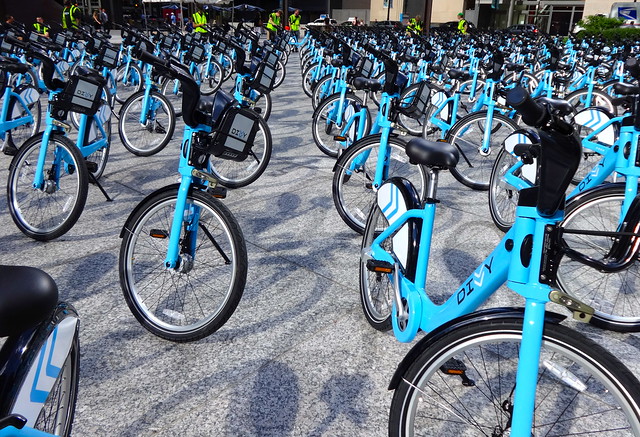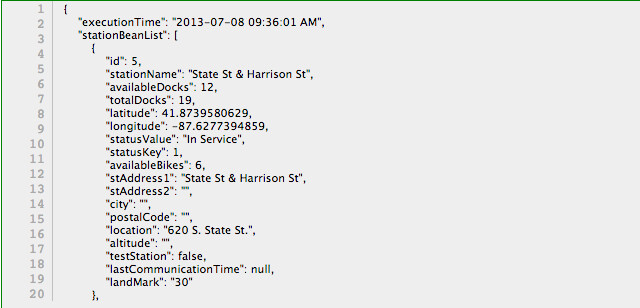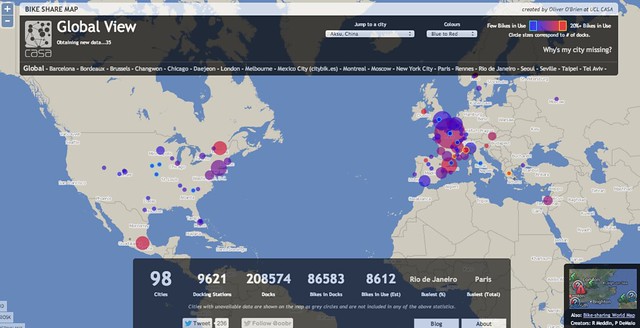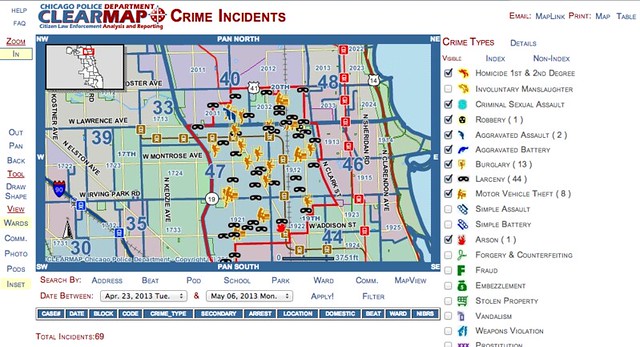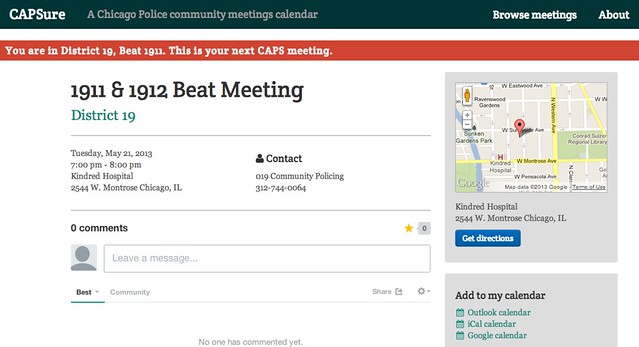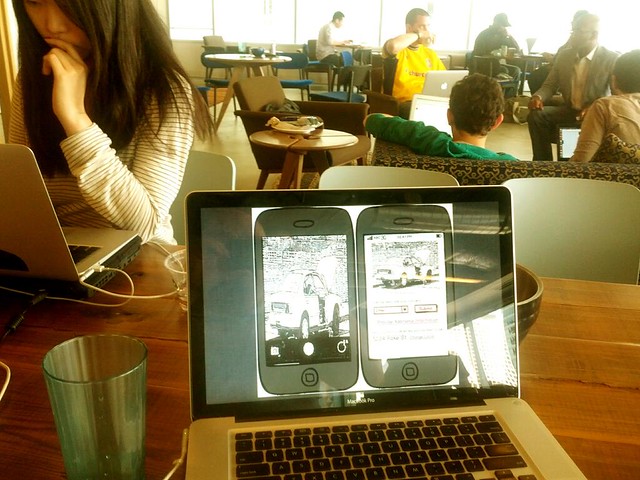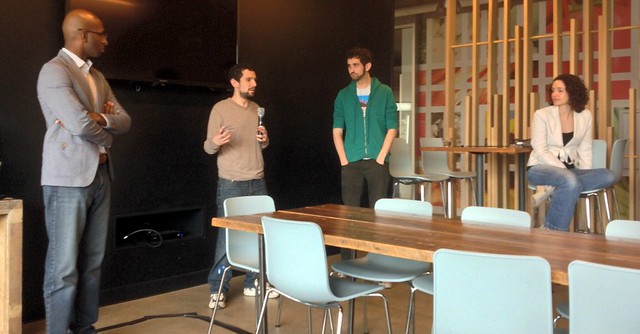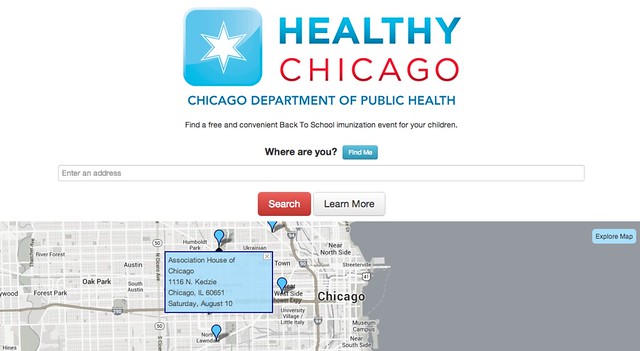
One of the success stories in Chicago’s civic innovation community is the rapid spread of health related apps that have come out of both the volunteer civic technology community and paid development efforts. This started last year with Tom Kompare’s Chicago flu shot app that helped Chicago residents find free flu shots near them. (Later on, this flu shot app spread to Boston and Philadelphia.)
Professionally, Kompare is a web developer with the University of Chicago. In his spare time, he’s one of the most active civic technologists in Chicago.
Kompare’s flu shot app was just the start of the Chicago Department of Public Health partnering up with civic technologists on a number of projects including Foodborne Chicago, the Chicago Health Atlas, and Tom Kompare’s newest app Back to School.
Back to School is an app built for parents to make sure that their child has the immunizations they need to go back to school. CDPH hosts several immunization events for school children throughout the city and the apps helps parents find events near them. This will be also good trial run for the larger immunization effort that CDPH will run this fall.
Not only do these two apps use the same data format, this data format is now a proposed national standard. Shortly after the redeployment of the flu shot app in Philadelphia earlier this year, Philadelphia Chief Data Officer Mark Headd began an effort to develop a national standard for flu shot data. This effort included input from both government officials and civic technologists from Chicago, San Francisco, Austin, Oakland, and other cities. By helping to set up one standard, both of these open source apps are deployable in any city that elects to conform to the standard.
This is not the first app that the Chicago Department of Public Health has partnered with. CDPH also partnered with the Smart Chicago Collaborative to run the Foodborne Chicago app. The app, which was made possible through a variety of efforts, listens to Twitter for reports of food poisoning and then prompts the author to a web page that reports food poisoning to 311. Once it’s reported the 311, the city can then dispatch a health inspector to that location.
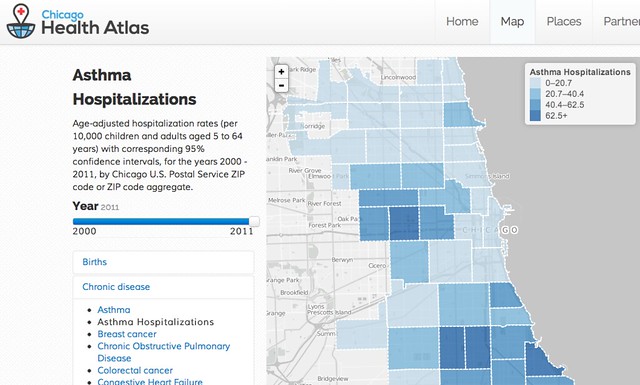
The Chicago Health Atlas, an app that shows health trends and local resources in Chicago, was another app that resulted from community partnerships. Initially, the Atlas was built on an existing partnership by informatics researchers at five major academic health centers in Chicago: University of Illinois at Chicago, Stroger Hospital, University of Chicago, Northwestern University, and Rush University. Since that time, the Chicago Health Atlas has been expanded to include data and researchers from the Chicago Department of Public Health. The site itself was built by Chicago civic app firm Datamade and also uses data from civic startup Purple Binder.
And it’s not just formal partnerships that are producing health related apps. As part of a summer internship program, Chicago Spanish newspaper Vive Lo Hoy hired its first web developer Wilberto Morales. Morales worked with food inspection data provided by the City of Chicago to built eatsafe.co.
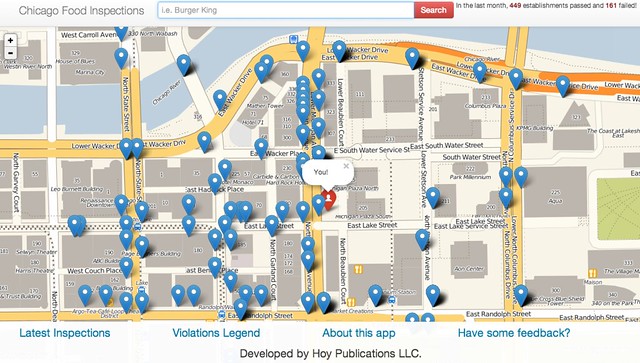
Eatsafe.co helps residents find out how the resturants near them fared during their last food inspection. This open source app includes information on how food inspections in Chicago work. (Unlike some other cities, Chicago’s system is pass-fail and not by letter grade.) This is Hoy’s first app and they plan to continue building more apps to help address community issues.
Morales learned to code, not from a formal computer science program, but by being a part of FreeGeek Chicago’s Supreme Chi-Town Coding Crew. FreeGeek Chicago, a Humboldt Park non-profit organization, helps the community by recycling and repairing old electronics. FreeGeek trains volunteers on computer repair techniques and offers the opportunity for residents to earn a refurbished computer through their Earn-A-Box Program. In March, FreeGeek’ Chicago’s members decided to launch a program to teach residents how to develop web applications. It’s certainly been a big success, as evidenced by the Supreme Chi-Town Coding Crew winning the Chicago Migrahack with their app Finding Care.
So why is Chicago producing so many high quality health apps so quickly?
Lesson 1: It starts with open data
Data is fuel. None of these applications would be possible without the City of Chicago developing an open data policy and executing on it. Chicago has more data sets than any other city. Their deep involvement with the civic technology community allows the city’s data team to meet the needs of civic innovators creating apps that serve the community.
Lesson 2: Partnerships are extremely important
The Chicago OpenGov Hack nights attract some of the city’s best geeks to work at the intersection of technology and civic problems. However, if the hack nights and other civic innovation efforts only attract web developers, designers, and data gurus we end up missing a vital piece of the puzzle: the neighbor that we’re trying to help.
By partnering with city departments, non-profit organizations, and community organizers – the community is able to develop apps centered around the civic problem in a way that helps the people who are working in the trenches. Both volunteer efforts like OpenGov Chicago and the Smart Chicago Collaborative are continuing to do outreach with civic organizations to help foster partnerships between technologists and community activists.
Lesson 3: Grow your own talent
The civic innovation community is growing – but not nearly fast enough. To meet the challenges brought on by the Great Recession, we need more people with technology skills necessary to grow the civic technology space. Efforts by FreeGeek Chicago and the Englewood Codes project by Teamwork Englewood are helping to create more technologists in the city’s neighborhoods.
Lesson 4: Solve real problems
Lastly, it’s important that the civic innovation community solve real problems that matter to real people. Part of the side effect of having strong partnerships in both government and the neighborhoods is the learning what is happening on the front lines of civic work. The Back to School app came about as a result of Tom overhearing a conversation about CDPH’s back to school campaign while working on the update for the flu shot app. Having civic technologists listening to not only tech issues, but issues like education results in web app like schoolcuts.org being created.
Building civic apps is more than just the code – the real secret to success is community.




